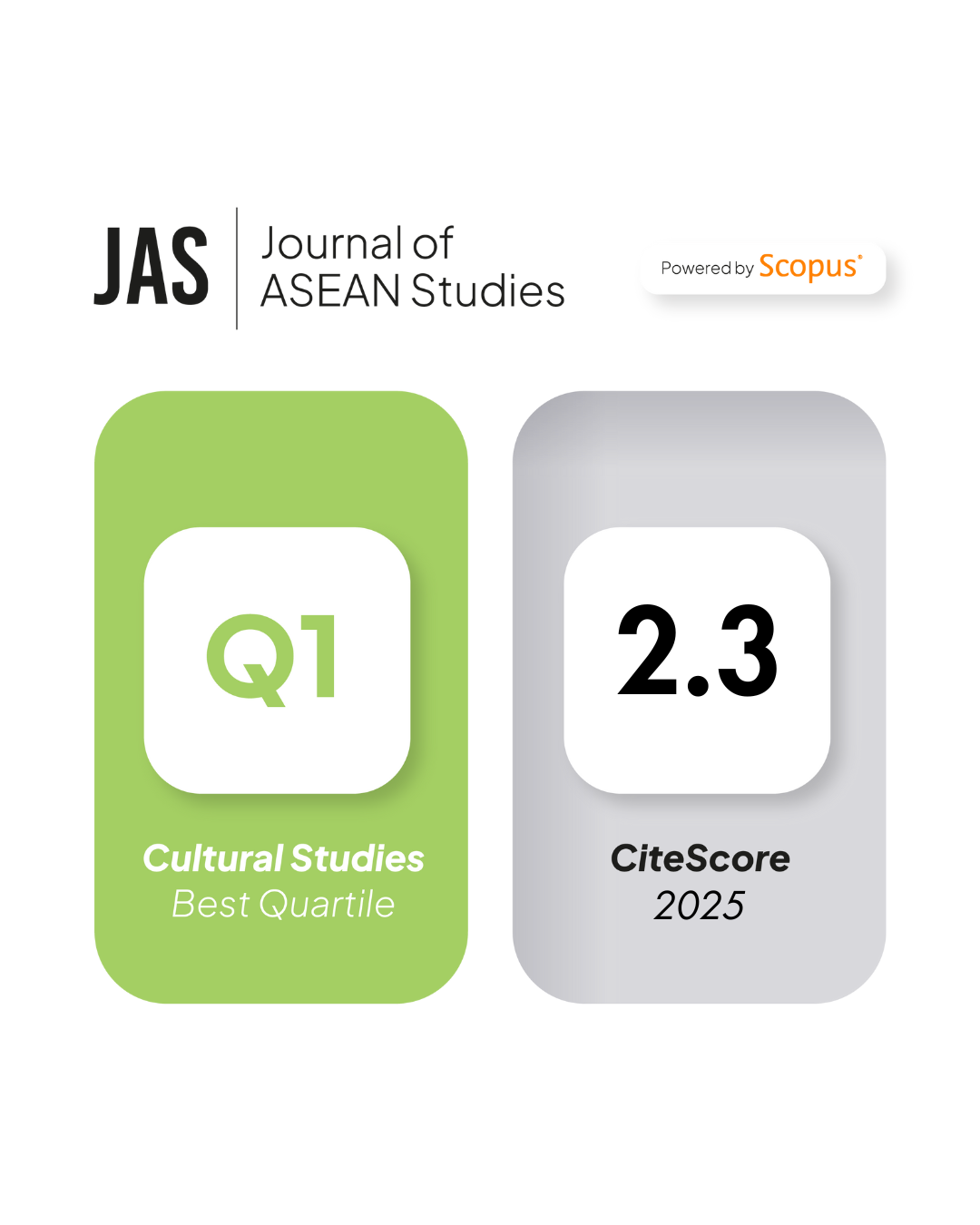The (In)visibility of Taiwan – Indonesia Relations: Indonesian Students on the Sideline
DOI:
https://doi.org/10.21512/jas.v6i2.5354Keywords:
Indonesian Student, Taiwan-Indonesia Relations, Academic ExchangeAbstract
Indonesian students have been playing significant roles as the agent of change in the process of Indonesia’s nation building. In the era of Indonesia’s struggle for independent, students had become the backbone of many important movements. Students were also the driving force of Indonesia democratization movement in 1998. Thus, it can be inferred that students are the important agent in shaping the direction of Indonesia.
On the other hand, discord between China and Taiwan regarding Taiwan status has been making Taiwan – Indonesia relations growth more significant in informal than formal channel. One of the efforts to increase the informal channel is undertaken by establishing academic exchanges, scholarships, and scholar exchanges. However this effort is seemingly still on creating cooperation with academic institution to increase the number of Indonesian students in Taiwan per se but it arguably could upgrade both entities relations only if the operationalization of academic policy is parallel with their  attempt to  increase  the relation. Â
Currently,  there are  approximately  3,052 Indonesian students enroll in many universities in Taiwan. Yet, there is no such effort applying by Taiwan government to take advantages from this situation in order to increase Indonesia-Taiwan further relations. This paper, therefore, is aimed to deliver two arguments. First, Taiwan academic relations with Indonesia are still focusing on the effort to increase the number of Indonesian students in Taiwan and neglect their potential as agent of cooperation. This condition has made the students as agent become invisible. Second, Taiwan’s policy in academic cooperation with Indonesia is not in line with Taiwan’s effort to upgrade  its relation  with  Indonesia. As  an  impact, Taiwan  –  Indonesia relation remains stagnant and invisible. In addition this paper will also deliver a clear description of the Indonesian students’ characteristic in Taiwan and the potential factors that  are  embedded on  them.  In order  to  get its  finding  and support  the secondary data, this paper also will conduct observations and interviews to the Indonesian students in Taiwan.
References
Haas, E. B. (1964). Beyond the Nation-state: Functionalism and International Organization. California: Stanford University Press.
Jie, C. (2002). Foreign Policy of the New Taiwan: Pragmatic Diplomacy in Southeast Asia. Northampton, M.A.: Edward Elgar Publishing, Inc.
Klintworth, G. (1995). New Taiwan, New China: Taiwan’s Changing Role in the Asia- Pacific Region. New York: St. Martin’s Press.
Lee, K. (1990). The Republic of China and Southeast Asia: More Than Economy. In Yu San Wang (Ed.) Foreign Policy of the Republic of China on Taiwan: An Unorthodox Approach. New York: Praeger.
Weiss, M. L. & Aspinall. E. (2012). Student Activism in Asia: Between Protest and Powerlessness. Minessota: University of Minnesota Press.
Aditya, R. (2015, January). Cooperation Without Harmony: Why Taiwan-Indonesia Economic Cooperation Arrangement is Difficult to Achieve?. Paper presented at international conference on Taiwan the View from the South, China in the World, College of Asia & the Pacific, Australian National University.
-------------------. (2014). Taiwan Tunnel: A Tool for Indonesia-Taiwan Economic Cooperation Arrangement. Paper presented in Graduate student Conference, IMPIS, National Chengchi University.
Center for Political Studies (P2P) LIPI. (2012). Feasibility Study of Economic Cooperation Arrangement Between Indonesia-Taiwan. A Policy Paper. Jakarta.
Haas, P. M. (1992). Introduction: Epistemic Communities and International Policy Coordination. International Organization 46, no. 1 (Winter).
Hsieh, S. H. (2001). Case Studies on Taiwan Cooperative Agribusiness-scale Production and Marketing of Asparagus and Mushrooms in Indonesia. Paper on Indonesia Project Report International Cooperation and Development Fund.
Larus, E. F. (2006). Taiwan’s Quest for International Recognition. Issues & Studies 42, no. 2 (June).
Leong, H. K. (1995). New Directions in Taiwan-Southeast Asia Relations: Economics, Politics and Security. Pacific Focus X, no. 1 (Spring).
IETO. (2014). Laporan Akuntabilitas Kinerja Tahun 2013. Taiwan: Taipei.
Indonesian Ministry of Trade. (2011). Peraturan Menteri Perdagangan Republik Indoneisa Nomor 08/M-DAG/PER/4/2011 tentang Organisasi Tata Kerja Kantor Dagang dan Ekonomi Indonesia di Taipei. Jakarta.
Indonesian Presidential Office. (1994). Keputusan Presiden Republik Indonesia, No. 48 Tahun 1994 tentang Kantor Dagang dan Ekonomi Indonesia di Taipei. Jakarta.
BKPM. (2014). Perkembangan Realisasi Investasi PMA Berdasarkan Laporan Kegiatan Penanaman Modal (LKPM) Menurut Negara Triwulan 3 2013. Retrieved October 3, 2014, from http://www7.bkpm.go.id/contents/ p16/statistics/ 17#.VDE8ivmSxqU.
Ministry of Labour. (n.d). Workforce Development Agency. Retrieved October 3, 2014, from http://statdb.mol.gov.tw/html/mon/c12030.pdf.
Lembaga Peningkatan Sumber Daya Manusia Aceh. (n.d). Data Penerima Beasiswa. Retrieved March 21, 2015, from http://lpsdm. acehprov.go.id/index.php/data.
IETO. (n.d). Penandatanganan MoU on Morotai Development Project. Retrieved March 21, 2015 from http://www2.kdei- taipei.org/index. php/berita/item/290-penandatanganan-mou-on-morotai-development- project/.
IETO. (n.d). Pertemuan Kedua Steering Committee pada Morotai Development Project antara Indonesia dan Taiwan. Retrieved March 21, 2015 from http://www2.kdei-taipei.org/index.php/berita/item/312-pertemuan-kedua-steering-committee- pada-morotai-development-project-antara-indonesia-dan-taiwan.
IETO. (n.d). Sejarah Singkat. Retrieved March 21, 2015 from http://www2.kdei-taipei.org/index.php/2014-08-11-03-58-09/sejarah-singkat.
Taiwan Ministry of Education. (n.d). International Students in Tertiary-by nationality, field & gender. Retrieved March 19, 2015, from https://stats.moe.gov.tw/files/gender_e/e111-1.xls.
----------------------. (n.d). Overseas Compatriot Students (include Hong Kong and Macao) in Tertiary- by school, nationality & gender. Retrieved March 19, 2015, from. https://stats.moe.gov.tw/files /gender_e/e111-1.xls.
----------------------. (n.d). International Students in University Affiliated Mandarin Center - by school,nationality & gender. Retrieved March 19, 2015, from https://stats.moe.gov.tw/files/gender_e/e111-1.xls.
----------------------. (n.d). Exchange Students in Tertiary - by school, nationality & gender. Retrieved March 19, 2015, from https://stats.moe.gov.tw/files/gender_e/e111-1.xls.
TEC Offcial Website. (n.d). About TEC. Retrieved February 16, 2015, from http://portal.tecindonesia.com/?page_id=13&lang=en.
Ministry of Foreign Affairs. (n.d). The Taipei Economic and Trade Office (TETO) Jakarta, Indonesia. Retrieved March 19, 2015, from http://www.roc- taiwan.org/id/ ct.asp?xItem=468203&CtNode=4821&mp=292&xp1=


























